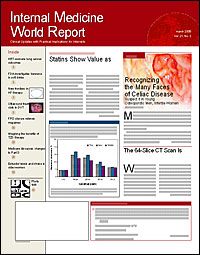Moderate Coffee Consumption May Keep Type 2 Diabetes at Bay
Previous studies have shown that drinking ≥5 cups of coffee each day may reduce the risk of developing type 2 diabetes. But until now this association had not been tested among those who drink lesser amounts of coffee. A new study published in Diabetes Care (2006;29: 398-403) has found that even moderate consumption may lower the risk of diabetes in adults.
Included in this prospective cohort study were 88,259 women (aged 26-46 years) from the Nurses' Health Study II who did not have diabetes at baseline. Coffee consumption, along with intake of other foods and beverages containing caffeine, were evaluated periodically beginning in 1991. Between 1991 and 2001, a total of 1263 cases of type 2 diabetes were reported.
After adjusting for potential confounders, the relative risk (RR) of type 2 diabetes among those who drank coffee was 0.87 for 1 cup daily, 0.58 for 2 to 3 cups daily, and 0.53 for ≥4 cups daily compared with those who did not drink coffee (P <.001). Similar findings were reported for those drinking 1 cup daily of caffeinated (0.87), decaffeinated (0.81), filtered (0.86), and instant (0.83) coffee. Tea did not significantly reduce risk of type 2 diabetes; RR was 0.88 for those who drank ≥4 cups of tea daily compared with nondrinkers (P = .81).
Caffeine content estimates were:
? 1 cup of coffee = 137 mg
? 1 cup of tea = 47 mg.
Overall, higher total coffee consumption was associated with a lower risk of type 2 diabetes in each category of caffeine intake. Those who drank more caffeinated coffee compared with decaffeinated coffee were also found to be more likely to consume higher levels of alcohol and to be cigarette smokers.
Despite these results, lead investigator Rob M. van Dam, PhD, of the Harvard School of Public Health in Boston, and colleagues tried to dissuade physicians from thinking that coffee drinking may be a way to avoid diabetes.
"Weight management and increased physical activity, which can lower risk of multiple chronic diseases, should be the mainstay of preventive efforts to reduce the incidence of type 2 diabetes," they wrote.
